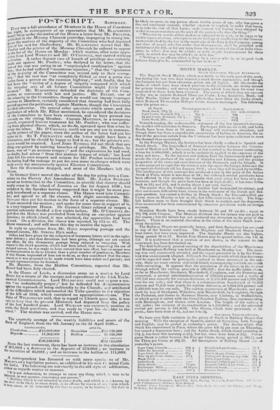POsTSCRI PT • SATURDAY.
There was a full attendance of Members in the House of Commons
t ;gm, In consequence of an expectation that Mr. BLACKSTONE 3,06-taid) hring under the notice of the House a letter from Mr. POULTER, poll the in the Morning Ch ng Chronicle yesterday, impugning in stro Ian.
po..
c ige the motives of ,the majority of the Committee who had deprived itil‘n of his seat for Shaftesbury. Mr. BLACKSTONE moved that Mr. alter and the printer of the Morning Chronicle be ordered to appear a he bar of the House on Monday : which motion, after some oppo- :titon from Lord WORSLEY and Mr. O'CoNsieu., was carried without a. division. A rather flagrant case of breach of privilege was certainly made out against Mr. Poulter ; who declared in his letter, that the lass of his seat was owing to an "unprincipled combination" against
that he had suffered "monstrous injustice ; " that the "ignorance
f the mojority
of the Committee was second only to their corrup- t
O
jea;" that his seat was "as completely filched as ever a purse was ola from a person on the common highway ;" and, finally, that he bad been the "victim of a degree of iniquity compared with which the irregular acts of all former Committees might fairly stand excuse. d " Mr. BLACKSTONE defended the decisions of the Com- mittee, as consonant with law and justice. Mr. ELLIOT, one of the minority in the Committee, though be would not impute improper motives to Members, certainly considered that treating had been fully proved against the petitioner, Captain Matthew, though the Committee decided otherwise. On several other questions which arose, and the particulars of which Mr. Elliot mentioned, he considered the decisions of the Committee to have been erroneous, and to have pressed too severely on the sitting Member. Captain MATTHEW, in a temperate speech, requested lenient treatment for Mr. Poulter ; who was suffer. ing from physical illness, which, no doubt, operated upon him when he wrote the letter. Mr. O'CONNELL could not see any use in summon- ing the printer of the paper, since the author of the letter had put his name to it. Sir T. FREM ANTLE said, the letter might have been a fabrication and he should be happy to find it so ; but the printer's evi- dence would be required. Lord JOHN RUSSELL did not think that any thing was gained by noticing breaches of privilege. Mr. Poulter, be knew, was of" an anxious temper ;" and the expressions he had used, no doubt, had arisen " from that anxious temper of mind ;" but Lord John felt his own respect and esteem for Mr. Poulter increased from his having had the courage to put his own name to charges which were made every day anonymously against Election Committees.
Here the discussion dropped, and most of the Members left the House.
Sir GEORGE GREY moved the order of the day for going into a Corn- mittee on the Slavery Act Amendment Bill. Mr. JAMES STEWART moved an instruction to the Committee, to provide that slavery should totally cease in the island of Jamaica on the 1st August 1838; but withdrew it, the Speaker having suggested that it might be more pro- perly introduced as a separate clause. The House went into Commit- tee; and agreed to all the clauses, with slight amendments. Mr. STEWART then put his motion in the form of a separate clause. Mr. Wane seconded the motion ; and spoke for some time in support of it, to a very impatient House. Sir GEORGE GREY refused to reopen a question solemnly decided a few nights before. Mr. O'CONNELL de- nted that the House was precluded from making an exception against Jamaica; in which island, it was admitted, the apprentices had been ill used. On a division, the clause was rejected, by 115 to 61. The House resumed ; and will meet this day to receive the report.
In reply to questions from Mr. HALL respecting postage and the stamped covers, Mr. SPRING RICE said— Orders had been given for the reduction of fourpenny letters within the eight. miks delivery; also that directions had been given, although not yet carried into effect, for the threepenny postage being reduced to twopence. With respect to the third question, which had been asked, that respecting the use of stamped covers, he was ready to have carited that into effect, but so sooner was his determination to do so known, than a great number of gentlemen, Members of that House, requested of him not to do so, as they considered that the expe- riment as it was proposed to be made would have been unfair and partial; and as such representations he desisted. Mr. BRODIE, from the Maldon Committee, reported that Mr. Round had been duly elected.
In the House of Lords, a discussion arose on a moth 11 by Lord RIPON for a return of the receipts and expenditure of the lush Eccle- siastical Commissioners. Lord MELBOURNE could not oi pose a mo- tion "so undoubtedly proper ;" but he defended his At:ministration against the reproach of being unfriendly to the Church ; and attributed all the difficulties which surrounded the Tithe question to II e rejection of the bill of 1834, which contained no appropriation-ckuse. The Duke of WELLINGTON said, that in regard to Church quest :ons, it was vain to deny that the present Ministers had departed from the policy of the last hundred years. Lord WICKLOW was extremely anxious to settle the Irish questions, and was ready to "pint his slat lder to the wheel." The motion was carried, and the House rose.


























 Previous page
Previous page